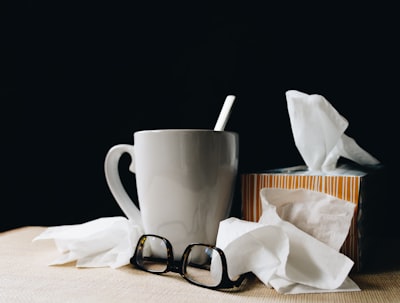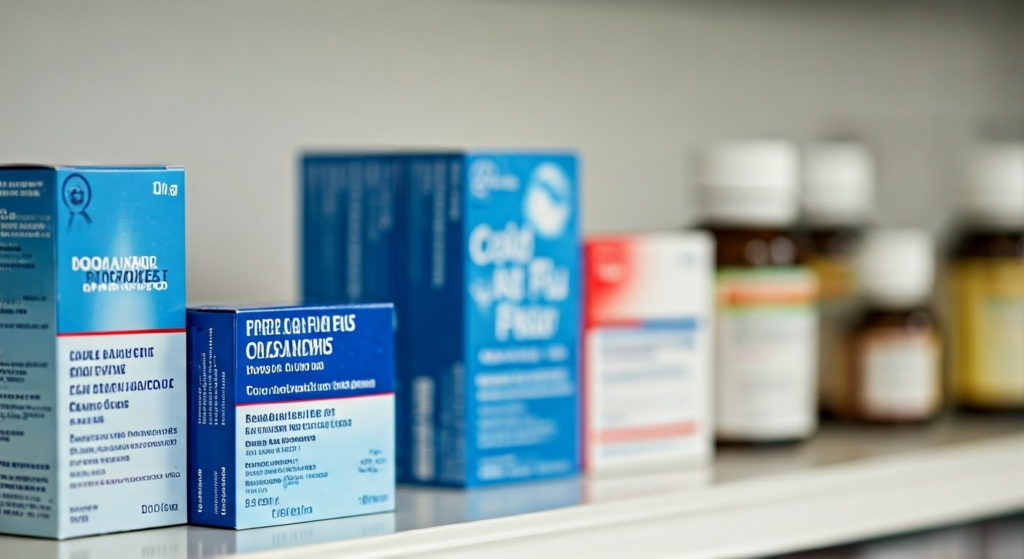Ultimate Guide to Cold Flu Medicine Drugs

Key Highlights
- Colds and flu share symptoms but require different treatments.
- Over-the-counter medications can help manage fever, congestion and cough.
- Natural remedies can provide soothing relief and immune support.
- Prescription antivirals can shorten flu duration but are not for everyone.
- Always consult a healthcare provider for severe or persistent symptoms.
- Pay close attention to the active ingredients in medications to avoid overdose.
Introduction
Navigating cold and flu medicine can be tough. We all know that the common cold and flu come with annoying symptoms. It is important to understand your symptoms. Picking the right treatment, approved by the Food and Drug Administration for cold symptoms, can help you recover quickly. This guide will give you useful information about cold and flu medications. It will help you make good choices about your health care.
Understanding Cold and Flu Symptoms
The common cold and the flu are similar but not the same. Both can give you a sore throat, a runny nose, and nasal congestion. They are caused by different viruses and can feel very different. When your nose is stuffy or dripping, that is nasal congestion.
Cold symptoms usually come on slowly and are not as strong as flu symptoms. The flu hits hard and fast. It can cause fever, body aches, headaches, and other signs like those of a cold.
Distinguishing Between Cold and Flu

It can be hard to tell the difference between a cold and the flu. However, there are some signs that can help you. Flu symptoms usually include a high fever, chills, and muscle aches. These symptoms are not common with a cold. You may also have a strong cough with the flu.
If you have any health issues, like high blood pressure, diabetes, or heart disease, be careful with over-the-counter medications that can affect your heart rate. This includes cough medicine and decongestants. Talk to your doctor or pharmacist to make sure the medicine is safe for you.
It’s important to know if you have a cold or the flu. This helps you choose the right treatment. If you are unsure, it’s best to ask a healthcare professional.
Common Symptoms and Their Implications
A stuffy nose is also called nasal congestion. It is a common sign of colds and flu. This happens because the nasal passages get inflamed. This can make breathing through the nose hard and cause discomfort.
A sore throat is another common issue. It can feel scratchy or itchy. This is often one of the first signs of both colds, flu, and asthma. Coughing and congestion can make it worse.
Fever usually means you have the flu, but sometimes it can happen with colds too. If your temperature is higher than 100.4°F (38°C) for adults or 100.8°F (38.2°C) for children, it is important to get medical help.
Over-the-Counter Medications for Cold and Flu

Over-the-counter (OTC) medicines won’t cure a cold or flu, but they can help you manage your symptoms. This way, you can feel better quickly. OTC medications focus on specific symptoms.
For instance, decongestants reduce swollen nasal passages, which helps with a stuffy nose. Pain relievers and fever reducers can help lower fever and ease headaches and body aches.
Decongestants: Types and Precautions
Decongestants come in two main types: oral decongestants and nasal sprays. Oral decongestants are in pill or liquid form. They offer temporary relief from nasal congestion by narrowing blood vessels. However, some oral decongestants can raise blood pressure for a short time. People with high blood pressure should talk to a doctor before using them.
Nasal sprays work directly in the nasal passages. They provide quick and effective relief. But, if you use nasal sprays for too long, they can cause a rebound effect. This means your congestion might get worse once you stop using them.
Always stick to the recommended dosage for any decongestant you choose.
Antipyretics: Managing Fever Effectively
Antipyretics are medicines that help lower fever, which is a common symptom of the flu. Acetaminophen (Tylenol), aspirin, and ibuprofen (Advil, Motrin) are two popular choices available without a prescription. They can lower body temperature and provide much-needed relief.
Choosing the right antipyretic depends on what you need and prefer. Healthy adults can safely use acetaminophen, which is usually safe but can hurt the liver if taken in high amounts. On the other hand, ibuprofen can upset the stomach and might not be good for people with certain health issues.
When you use antipyretics, always follow the dosage on the package. If your fever lasts, it’s important to talk to a doctor.
Natural Remedies and Supplements
Natural remedies can help alongside traditional medicines. They can provide comfort and promote good health when you have a cold or the flu. These treatments work best when you start using them as soon as you feel sick.
Whether it’s easing congestion or calming a cough, natural solutions can support your path to recovery.
Echinacea and Vitamin C: Boosting Your Immune System
Echinacea and vitamin C are popular natural remedies. They are often said to help the immune system. Some studies show that echinacea might reduce how long and how serious the common cold can be.
Vitamin C is important for a healthy immune system. Still, there is not much proof that taking a lot of vitamin C can stop colds from happening.
Yet, it is good to have enough vitamin C in your diet or through supplements. This can help your overall health, especially during the cold and flu season.
Honey and Lemon: Soothing Sore Throats Naturally
Honey and lemon are a simple and effective way to ease a scratchy throat, especially sore throat lozenges, something many people face during cold and flu season. Honey is thick and coats the throat, giving temporary relief.
Lemon has vitamin C, which helps decrease mucus and keeps you hydrated. However, keep in mind that honey is safe for adults and older kids but should not be given to infants under one year of age because it can cause botulism.
You might want to try mixing this home remedy with warm water or tea for even better soothing effects.
Prescription Medications for Severe Cases
In some situations, over-the-counter medications, including an antihistamine, may not be enough to fight the flu. Your healthcare provider may give you antiviral drugs to help your body battle the virus and reduce symptoms.
Antiviral medicines are different from antibiotics. Antibiotics only work against bacteria, not viruses. Always check with your doctor to see if you need a prescription for your case.
Antivirals: When Are They Necessary?
Antiviral treatment is a type of prescription medicines that doctors prescribe to fight the influenza virus, which is what causes the flu. This medicine can help make flu symptoms go away faster and can make you feel better, especially if you take it within the first 48 hours of getting sick.
Not everyone with the flu needs antiviral treatment. Your healthcare provider will look at things like your age, health, and how bad your flu symptoms are before deciding if you should take this medicine.
If your flu symptoms last longer or get worse, it’s important to get medical attention right away. This way, you can find out if antiviral treatment is right for you.
Antibiotics: Understanding Their Role
Antibiotics are strong medicines that fight bacteria. They are the cause of bacterial infections. But it’s important to know that antibiotics do not work on viral infections, like the common cold and the flu.
Using antibiotics when you don’t need them can cause antibiotic resistance. This is becoming a serious health issue. It makes it harder to treat bacterial infections in the future.
So, it’s important to talk with your health care provider. They can help you find out if you have a bacterial infection that needs antibiotics, or a viral infection that you can treat with rest, water, and some over-the-counter medicines.
Special Considerations
Certain groups need special attention when taking cold and flu medicines, including people with chronic lung disease. These groups are children, pregnant and breastfeeding women, older adults, and people with long-term health issues. Always talk to your doctor or pharmacist before giving any medicine to these people.
They can help you with the right dose, possible side effects, and safe options if necessary.
Medications for Children: Dos and Don’ts
Treating flu symptoms and cold signs in young children needs to be done carefully. The American Academy of Pediatrics says you should not give over-the-counter cough and cold medicine to kids under four years of age.
These medicines can be risky. Also, we do not know how well they work in young children. It is always best to talk to your child’s pediatrician before giving any medicine.
For safe and natural relief, you can use a humidifier, saline drops, or a bulb syringe to help with congestion. It’s also important to keep your child hydrated to help them recover quickly.
Pregnancy and Breastfeeding: Safe Options
Managing cold and flu symptoms during pregnancy and breastfeeding needs special attention. Some medicines can harm the baby or get into breast milk, especially when taken at higher doses. It is important to focus on your health and your baby’s health. Talk to your healthcare provider before taking any medicine.
They can suggest safe and effective options for your stage of pregnancy or breastfeeding.
Simple steps like resting, drinking plenty of fluids, and using a humidifier can help you feel better.
Conclusion
In conclusion, it is important to know the differences between cold and flu symptoms. This helps in getting the right treatment. You can choose over-the-counter medications, natural remedies, or prescription drugs. Always talk to a healthcare provider for advice that suits you best. In most cases, the best thing you can do is to rest, drink plenty of fluids, and manage your symptoms for a quick recovery. Remember, everyone reacts differently to treatments, so pay attention to your body. If you need help, don’t hesitate to seek medical advice. Stay aware, take action, and focus on your health during the cold and flu season.
Call to Action: Consult a healthcare provider for personalized cold and flu treatment recommendations.
Frequently Asked Questions
What is the fastest way to cure a cold?
There is no quick fix for the common cold. Your immune system needs time to get rid of the virus. Still, drinking plenty of water and resting can help. You can also use over-the-counter products like cough medicine, analgesics, or nasal decongestants to manage your symptoms and get better faster.
Can flu be treated without antibiotics?
Yes, the flu is caused by a virus. Antibiotics do not work against viruses. Treatment aims to support your immune system. This includes getting rest and drinking fluids. It also focuses on managing symptoms. Sometimes, your doctor might give you antiviral treatment.
https://medlineplus.gov/druginfo/meds/a608026.html
https://www.cdc.gov/antibiotic-use/colds.html
https://doi.org/10.1002/14651858.CD009345.pub2
https://mydr.com.au/respiratory-health/common-cold-treatments

